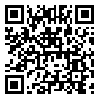Volume 22, Issue 2 (9-2024)
sjsph 2024, 22(2): 211-232 |
Back to browse issues page
Download citation:
BibTeX | RIS | EndNote | Medlars | ProCite | Reference Manager | RefWorks
Send citation to:



BibTeX | RIS | EndNote | Medlars | ProCite | Reference Manager | RefWorks
Send citation to:
Moslehi H, Pourmousavi S M, Zakani Z, Fayyaz R. Identifying Factors Related to Effective Psychotherapy from the Perspective of Therapists and Clients: A Qualitative Research. sjsph 2024; 22 (2) :211-232
URL: http://sjsph.tums.ac.ir/article-1-6280-en.html
URL: http://sjsph.tums.ac.ir/article-1-6280-en.html
1- Ph.D. Assistant Professor, Department of Educational Psychology, Faculty of Psychology and Educational Sciences, University of Tehran, Tehran, Iran
2- Ph.D. Student, Faculty of Humanities and Social Sciences, Islamic Azad University, Science and Research Branch, Tehran, Iran ,moosavimaryam67@gmail.com
3- Ph.D. Student, Faculty of Psychology and Educational Sciences, University of Tehran, Tehran, Iran
4- Ph.D. Assistant Professor, Department of Psychology, Faculty of Humanities, Tarbiat Modares University, Tehran, Iran
2- Ph.D. Student, Faculty of Humanities and Social Sciences, Islamic Azad University, Science and Research Branch, Tehran, Iran ,
3- Ph.D. Student, Faculty of Psychology and Educational Sciences, University of Tehran, Tehran, Iran
4- Ph.D. Assistant Professor, Department of Psychology, Faculty of Humanities, Tarbiat Modares University, Tehran, Iran
Abstract: (67 Views)
Background and Aim: Available evidence shows the effectiveness of psychotherapy. However, the number of patients who deteriorate or do not improve is still problematic. On the other hand, while some therapists are generally more successful than others, most therapists have experienced both success and failure of therapy in different cases. The purpose of this study was to determine the factors effective in psychotherapy from the perspective of therapists and clients.
Materials and Methods: Based on the purpose of this research, it can be considered as an applied research and qualitative in nature. Data were collected through interviews and analyzed using the content analysis method based on the analogical approach. The samples of therapists and clients were selected purposefully from the statistical population including 1. Therapists (psychiatrists, psychologists and counselors) licensed by the Psychology and Counseling Organization with 5 years or more of therapy experience, and 2. Clients who had participated in at least one psychotherapy course. The sample size was based on theoretical saturation and, therefore, the interview process continued until ensuring sufficiency of the collected data; thus the interviews ended with the 21st person in the therapists group and the 15th person in the clients group.
Results: The factors in effective treatment were found to be in three areas, namely, the therapist (attitude, competence, personality, maturity, ability and appearance), the client (demographic characteristics, reason and method of referral, insight), and environmental factors (economic, socio-political issues, location of the psychological center, supporting problems, and daily living events of clients and therapists).
Conclusion: The findings of this research show the components and importance of the model of effective factors in effective psychotherapy to policy makers, trustees, professors and therapists in the field of mental health. The achievement of these components can increase the efficiency of the therapists in achieving their goals and also help a clients to choose a therapist.
Type of Study: Research |
Subject:
General
Received: 2024/06/18 | Accepted: 2025/01/1 | Published: 2024/09/20
Received: 2024/06/18 | Accepted: 2025/01/1 | Published: 2024/09/20
Send email to the article author
| Rights and permissions | |
 |
This work is licensed under a Creative Commons Attribution-NonCommercial 4.0 International License. |






